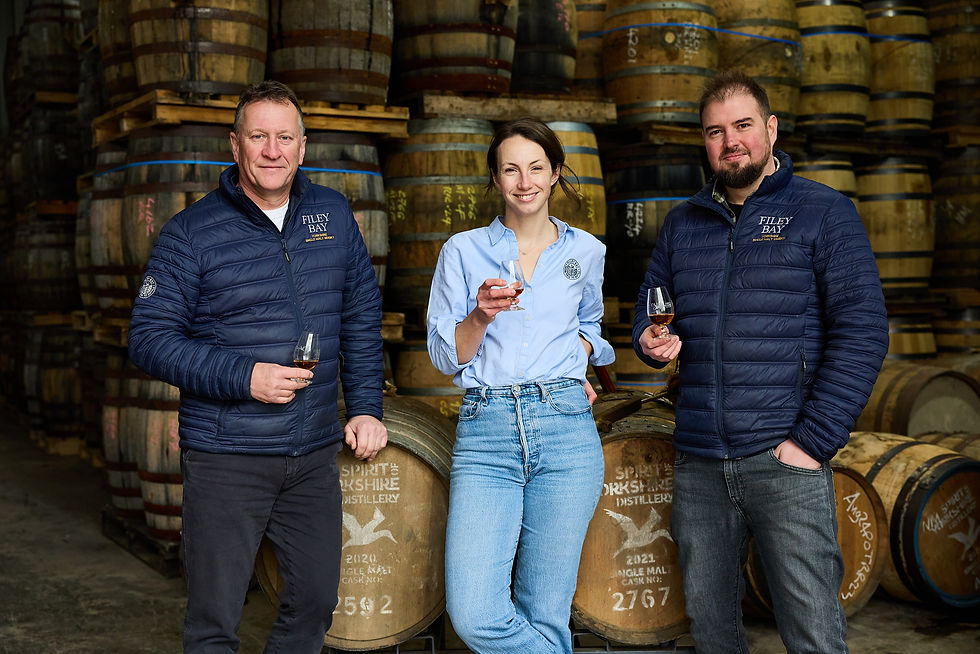EWG Distillery Focus: Fielden Whisky
- mgarden11
- Aug 19
- 3 min read

Our Summer 2025 distillery focus is Fielden - Whisky of England
What does English Whisky mean to you?
Right now, English Whisky means possibilities. It’s not bound by centuries of rules or rigid tradition. It’s a category still finding its voice - but it’s a voice already full of freedom, creativity, and diversity. Without the weight of centuries-old regulations, distillers here have the space to experiment: with grain varieties, fermentation styles, still types, and cask choices. That freedom means English Whisky isn’t tied to a single style - it’s defined by innovation, a sense of place, and the individuality of each maker.
What makes your whisky (and distillery) unique within the English Whisky sphere?
We want to shift the conversation from a fixed distillery and instead focus on where all great whisky starts - in the fields. You might say “What’s whisky got to do with farming?”. The answer is “everything”. Whisky starts in the soil. It’s an agricultural product. And in a world facing a climate crisis, agriculture needs to change. Most grain for whisky is grown industrially, with chemicals. We exist to change that. We’re not just making whisky from grain. We’re making whisky of the grain - of the soil it came from, the farmers who grew it, the growing season that shaped it.
We work with diverse - mostly heritage - grains to make our whisky. These grains are naturally adapted to low input farming, so we can grow them regeneratively, without the use of agri-chemicals. We call this “no chem regen” farming.
We’re bringing our fields back to life and letting nature take the lead. With healthy soil, clear waters and flourishing biodiversity in our fields, we’re nurturing wonderful and wild ecosystems above, and below ground. We partner with farmers who want to join us in this approach. It’s experimental, so we pay by acre planted and not by yield, so shielding our farmers from the commercial risk of a “poor harvest”.
Our aim is simple: bring the field to your glass. And hopefully, in the process, help shape a future where delicious things can also be good for the land.
When it comes to distilling, we work with multiple distilling partners, which gives us room to experiment: different still shapes, different mash bills, different approaches tailored to what’s been harvested.
Our cask program is expansive too. We mature in a huge range of barrels, experimenting with different wood species like American Oak, Chestnut and Acacia and every wine cask you can imagine - moscatel, sauternes and Tokaji to name just a few. To us, casks aren’t just flavour vessels - they’re interactive spaces where grain and wood meet and evolve. Our maturation programme is a flavour library in the making, helping us explore and express the richness of our diverse grains in ways that are endlessly creative.
What is the achievement that you are most proud of?
We are really proud of how we’re growing within the whisky world but also how we’re opening up conversations and reaching new consumers in the agricultural space. Fielden was launched in May 2024 and already we’re present in a wide range of Michelin Starred, Green Michelin Starred and top rated bars, restaurants and hotels. This year we had a presence at Chelsea Flower Show and we were a major sponsor at Groundswell Festival, one of the key events in the regenerative agriculture calendar. Everywhere we go the reaction is brilliant - to the whisky itself, and also to how we’re putting regenerative farming at the heart of what we do as a distillery.
What do you think will be the biggest challenge for English Whisky as we look towards 2026?
The category needs to keep building deeper consumer understanding. English Whisky doesn’t yet have the instant recognition of Scotch or Irish whisky, so education - about quality, style, and authenticity - will be key.
Behind the scenes, there are practical pressures too: securing the right casks, sourcing quality grain, and navigating a challenging economic climate. Those who can balance innovation with consistency, and make their values and flavour story resonate, will lead the way.
Longer term – how do you assess the future for English Whisky?
Right now, English Whisky is still young enough to be fluid, experimental and adaptable. That adaptability is its strength - allowing distillers to explore unusual grains, fresh approaches to production and to respond to changing consumer demand and expectations. But over the next decade, the challenge will be to turn that early flexibility and innovation into a reputation for consistency and quality that stands alongside established global whisky traditions.



